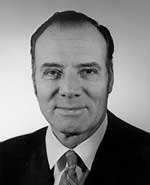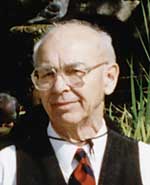Paul Carter
Paul Carter, professor emeritus of education at U-M-Dearborn, died Jan. 27 of heart failure. He was 96.

Carter was instrumental in building the education programs offered at U-M-Dearborn, including the creation of the master’s degree in education in 1975. As coordinator of teacher certification in the liberal arts division, Carter supervised the development of the teacher preparation program.
Carter began his career at U-M in 1957 when he was appointed assistant professor of education on the Ann Arbor campus. Two years later, he was promoted to associate professor and began dividing his time between the Ann Arbor and Dearborn campuses.
In 1963, Carter was promoted to professor and became chairman of the education faculty at U-M-Dearborn, a post he held until 1969 when he was appointed the first director of graduate studies. He retired from the faculty in 1977.
Among other initiatives, Carter led the development of a master of arts program in education, which was jointly sponsored by the School of Education in Ann Arbor and offered on the U-M-Dearborn campus.
“Throughout his years in education, Paul D. Carter exemplified the humanity, the inspiration and vigor of a dedicated educator,” the Board of Regents noted upon his retirement. “It is these qualities which won him the admiration of his colleagues and the enduring affection of his students.”
A Michigan native, Carter earned his master’s degree from U-M and doctorate from Wayne State University. He began his career as a classroom teacher and teacher-principal, and joined the Birmingham school system in 1942 as an elementary school principal. He later became the school district’s elementary coordinator and assistant superintendent.
Carter is survived by two sons, Alan from Ann Arbor and John from Northville.
A memorial service was held Feb. 5 in the chapel of Henry Ford Village in Dearborn. Memorial contributions may be sent to the Henry Ford Village benevolent fund, 15101 Ford Road, Dearborn, MI, 48126.
Woodrow Hunter
Woodrow Wilson Hunter, professor emeritus of social gerontology, died Feb. 2 at his winter home in Young Harris, Ga. He was 92.
He was a veteran of the U.S. Army, serving as lieutenant colonel in the European Theatre during World War II.
Beginning in 1930, Hunter spent the next decade at U-M, where he earned a bachelor’s and master’s degree. He taught at Central Michigan University and returned to U-M in 1946 as a professor of social gerontology. During that time, Hunter received meritorious awards for his contributions to the field of gerontology. He participated in the 1971 White House Conference on Aging and was named to the Department of Labor Expert Committee on Aging. He retired in 1978.
Family and friends remember Hunter for his never-ending kindness and generosity. His life’s work carried over to personal concern and care for many aging friends and family members. He offered wisdom and comfort and hope to those in need.
An avid gardener and builder of rock walls, Hunter found beauty in all nature. His gardens and rock walls grace the hills of Leelanau County and beyond.
He was married to Gustina May Croll for 47 years. She preceded him in death, as did a son, Michael Woodrow Hunter, who lost his life in the Vietnam War. He is survived by two daughters, Sara (Hunter) Rodeck of Traverse City, and Margaret (Hunter) Emerick of Vero Beach, Fla.; four grandchildren, Matthew Michael Hunter, Elizabeth Rodeck Stallman, Anne Rodeck and Adam Emerick; and one great grandchild, Lauren Ella Stallman.
A memorial service is being planned for the summer at the Swedish Mission Cemetery. Memorials may be directed to the Old Mission Congregational Church or the Leelanau Conservancy.—Submitted by the Hunter family
Robert Schafer
Robert Schafer, professor emeritus and one of the founding figures of U-M-Flint and the Department of History, died Jan. 18 at St. Joseph’s Hospital in Santa Ana, Calif.

Schafer served in World War II in the Air Force and later attended the University of California, Berkeley, where he received a master of arts in 1950 and doctorate in 1954. His field of study in graduate school was British history.
Schafer began his professional career as a lecturer in history at the California Institute of Technology (1953-54). He taught at Stanford University in 1955-56 before accepting the position of assistant professor of history at the Flint College of U-M in 1956—the year the senior college was founded. Schafer, who with Dorothea Wyatt taught all courses offered by the history department until 1965, was named associate professor in 1962 and professor in 1967.
He retired in 1989 to San Clemente, Calif.
While chair of the Department of History Schafer mentored younger colleagues who remember him as a wise, fair and humorous guide in the world of scholarship, academe and service to the Flint community.
Schafer was involved in all facets of university life. In addition to teaching, he served on numerous committees, including the Executive Committee, and three times as chairman of the history department. During the school’s early years, he was an advisor to several student groups and brought in speakers to discuss international understanding and foreign cultures. Near the end of his career, Schafer organized the U-M-Flint archives and, to a large degree, was responsible for its funding.
During his tenure at U-M-Flint, Schafer authored eight monographs on local history, including “Charles Stewart Mott of Applewood: A Memoir” (1984); “J. Dallas Dort Citizen Compleat” (1986); “Producing a Human Mosaic: Immigration and Economic Change In the Development of Genesee County’s Population” (1989); and “A History of the University of Michigan-Flint” (1990).
After his retirement, Schafer joined the docent team at Mission San Juan Capistrano, where he delighted in guiding grade-school children. He organized and digitized the mission’s document collection and authored “Toroni and Nu, Native Americans of the Mission San Juan Capistrano in the Colonial Period, 1776-1848” (2004).—Submitted by Mel Serow, U-M-Flint

